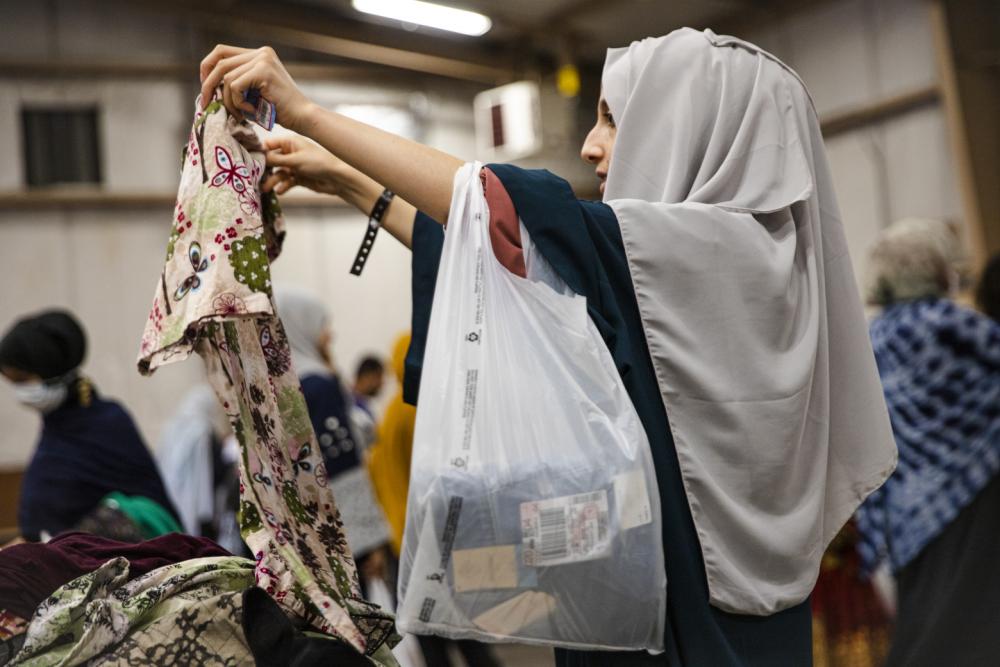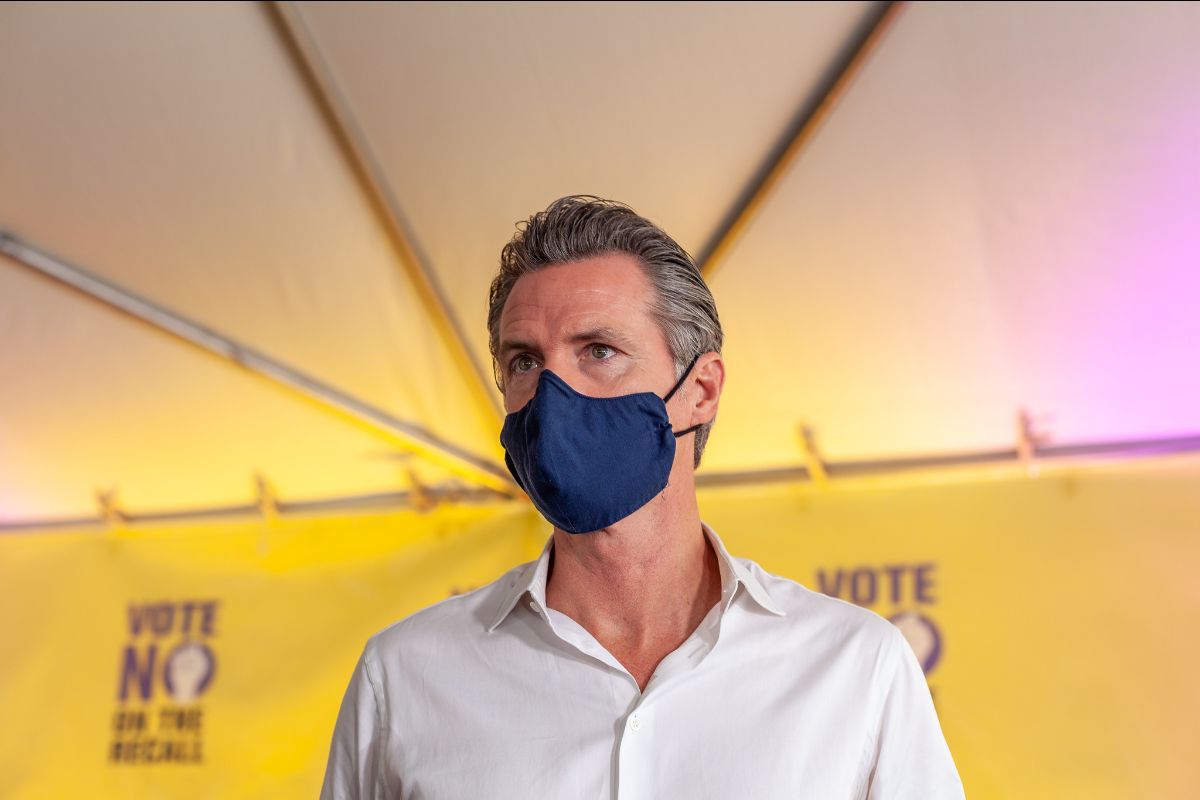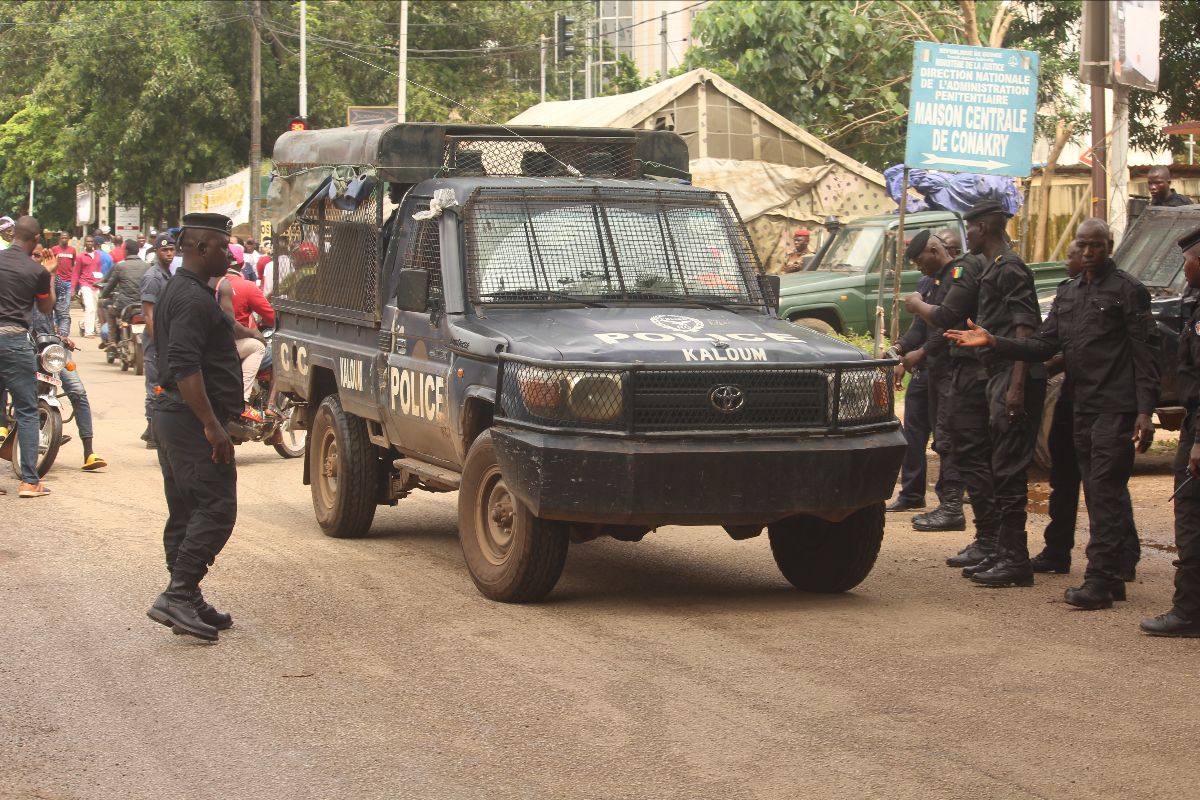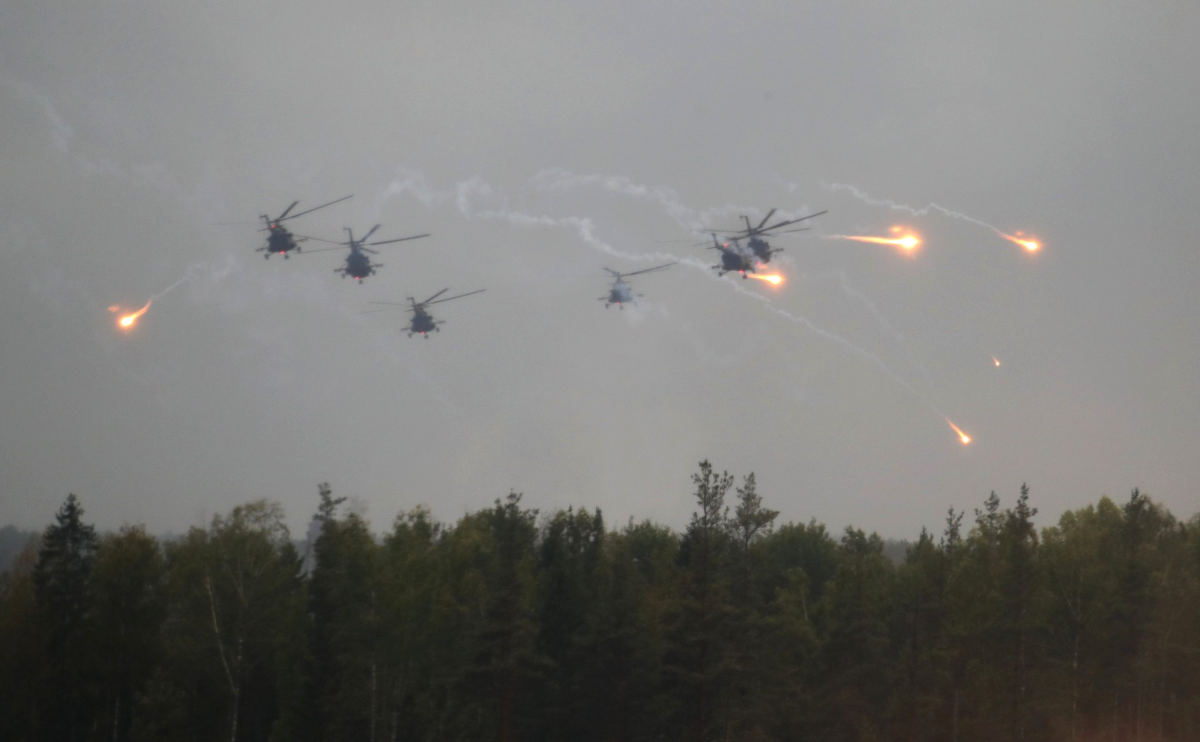Top photo: Russia and Belarus stage joint military exercises in Luga, Russia, in September 2017. (Photo: Press service of the President of the Russian Federation)
Welcome to Factal Forecast, a look at the week’s biggest stories and what they mean from the editors at Factal. We publish our forward-looking note each Thursday to help you get a jump-start on the week ahead. If you like what you see, you can subscribe for free.
A look ahead:
Sept. 10/ Russian military exercises in Belarus and Russia: Massive quadrennial military exercises led by Russia, known as “Zapad,” are set to begin Friday. The drills, which are the first of their kind since 2017, will take place at nine sites in Russia and five in Belarus.
- What’s happened so far: The large-scale Zapad, which translates to “west,” will involve roughly 200,000 soldiers, 80 aircraft and nearly 300 tanks, marking the largest such drills since the Cold War. While Russians will make up the bulk of the forces involved, nine other countries will participate in the drills, including India, with eight other countries observing.
- The impact: True to the drills’ name, the exercises will take place along Russia and Belarus’ western flank with NATO, including the heavily fortified Kaliningrad enclave. As such, the Baltic states and Poland expressed concerns about large numbers of Russian forces near their respective borders. NATO, meanwhile, called for Russian transparency, though the risk of accidental escalation remains considering the close proximity of Russian forces and NATO forces conducting surveillance, particularly in the naval realm in the Baltic Sea. The exercises come during a period of simmering tensions between Belarus and its neighboring NATO countries who allege Minsk is using migrants as tools to undermine them.

Sept. 11/ 20th anniversary of Sept. 11 attacks: Saturday marks the 20th anniversary of 9/11, the coordinated terrorist attacks that killed 2,976 people in the United States
- What’s happened so far: According to the White House, President Joe Biden will visit the three places hit by Al-Qaeda-coordinated terrorist attacks on Sept. 11, 2001. Biden and first lady Jill Biden will pay their respects to the victims in New York City, the Pentagon in Arlington, Va., and a rural area in Shanksville, Pa. — all places that were impacted by the hijacked airplanes. Vice President Kamala Harris and her husband will join the presidential couple at the Pentagon after a parallel event, but it is unclear if Biden will deliver a speech.
- The impact: Biden’s participation in the commemoration comes amid pressure from a group of victims’ families who maintain Saudi Arabia had a role in the attacks and have asked the president to refrain from attending memorial events unless documents that evidence this theory are declassified. Last week, the president ordered the Department of Justice to review FBI documents for declassification and release — something set to take place over the next six months.
Sept. 12/ Tokyo state of emergency set to expire: The Japanese government is considering extending coronavirus state of emergency measures past the planned end date Sunday, as healthcare systems remain overwhelmed by coronavirus.
- What’s happened so far: Coronavirus cases hit record highs in Japan several times since the Olympics began in July, with some experts claiming the games distracted from the pandemic and led to a false sense of security, though officials deny any connection. Vaccination rates are rising slowly, but saw a setback when Moderna was forced to recall more than 1.6 million doses in Japan after tiny stainless steel particles were discovered to have contaminated a batch.
- The impact: Daily tallies of new cases are declining, but the number of cases requiring inpatient care remains high, with many hospitals at full capacity and patients forced to stay home. Despite this, there are some reports that officials are considering easing restrictions on restaurants in areas under coronavirus emergency measures soon.

Sept. 13/ UN aid conference on Afghanistan: The United Nations will convene an international aid conference in Geneva on Monday to discuss the Afghanistan crisis.
- What’s happened so far: UN Secretary General Antonio Guterres announced the conference amid what he called a “looming humanitarian catastrophe” with severe drought affecting many Afghans. With the Taliban in power, millions of civilians face starvation due to the country’s isolation and an economy devastated by war and corruption. Meanwhile, Taliban have met with Martin Griffiths, UN undersecretary-general for humanitarian affairs, in Kabul to discuss humanitarian aid, with the Taliban claiming Griffiths promised continuation of humanitarian assistance.
- The impact: Guterres said he will seek an increase in funding for humanitarian relief in Afghanistan, where nearly half the population needs support. The U.S. Congress is expected to agree to finance the UN and other agencies providing humanitarian aid, but it is very unlikely it will directly fund a new Taliban-led government.
Sept. 13/ India’s top court holds hearing on Pegasus spyware: The Supreme Court of India on Monday will resume a hearing over the government’s alleged use of Israeli firm NSO’s Pegasus spyware on prominent Indian citizens, including journalists and politicians.
- What’s happened so far: In July 2021, an international media consortium published stories analyzing a leaked target list of 50,000 phone numbers and showing how governments around the world sought the hacking technology to surveil people including political dissidents, human rights activists, 180 journalists in nearly two dozen countries and even 14 heads of state. The consortium reported that more than 300 Indian mobile phone numbers were on the list, leading to several petitions demanding a court-monitored investigation into the alleged surveillance.
- The impact: The court is expected to receive another affidavit from India’s central government on the alleged spying. A previous filing by the government neither confirmed nor denied the use of the military-grade spyware, saying that divulging additional information on the issue may compromise national security. The spying allegations have led India’s main opposition party to accuse Prime Minister Narendra Modi of “treason.”
Sept. 13/ Norway parliamentary elections: Norway will head to the polls Monday to elect members to all 168 seats in Storting, the country’s supreme legislature.
- What’s happened so far: Prime Minister Erna Solberg of Norway’s Conservative Party is up for reelection after serving two consecutive terms since 2013. Though her administration was hailed by many for its response to the coronavirus pandemic, recent polls predict victory for the Labour Party, with Jonas Gahr Støre expected to become the new prime minister. The Labour Party is on course to return the worst individual results since 1924, however, it is expected to form a center-left coalition with the Socialist Left and Center parties, giving them the majority.
- The impact: A center-left majority government would be the first time since 2013 that the Conservative party will not be in power in Norway. Climate change surfaced as a key issue in recent weeks, and it’s an issue the Labour and Socialist Left remain divided on with Labour supporting continued petroleum exploration and Socialist Left opposing it. The Socialist Left and the Center parties, meanwhile, are both opposed to the current European Economic Area membership, bringing Norway’s relationship with the rest of Europe to the forefront in this election as well.

sponsored by long term care workers union SEIU 2015 on Aug. 14. (Photo: SEIU 2015)
Sept. 14/ California gubernatorial recall election: California Gov. Gavin Newsom’s time in the governor’s mansion may be coming to a sooner-than-expected end depending on how Tuesday’s recall election pans out. Voters will be deciding if Newsom gets to keep his job or if he’ll be replaced by one of 46 candidates competing for the role.
- What’s happened so far: Newsom has served about two-thirds of his term so far — much of which has been dominated by the coronavirus pandemic and a public frustrated with public health restrictions. And while those frustrations are widely believed to have fueled the initial momentum of the recall effort, some recent polling suggests Newsom may still have enough public support to stave off the recall. If political betting markets are any indication of how things might turn out, the recall effort looks likely to fail. The state’s only other recall election was in 2003, when voters replaced incumbent Democratic Governor Gray Davis with Republican Arnold Schwarzenegger.
- The impact: If Californians do vote to recall Gov. Newsom, they’ll be picking his replacement from a list of candidates devoid of prominent Democrats and no one endorsed by the Democratic Party. Instead, voters will be choosing from a field that includes front-runner Larry Elder, a conservative talk radio host who has promised to rescind all state-imposed mask and vaccine mandates.
Sept. 17/ Israel health experts brief FDA on boosters: The White House will consider a booster shot drive in the United States in a public session with Israel’s Health Ministry on Friday. If the committee concludes boosters are needed, it could give the current administration a mandate to approve a third Pfizer-BioNTech vaccine.
- What’s happened so far: Israel began offering Pfizer booster vaccines in July to senior citizens and has extended the program to people above the age of 12. About 2.6 million people, out of a population of 9.3 million, have received the third Pfizer vaccine. U.S. President Biden had to delay his own booster campaign, which was due to launch on Sept. 20, because Pfizer has so far been the only vaccine-maker to seek authorization for a third dose.
- The impact: While some believe the policy to be premature, others say it could help stop vaccine protection from waning. Israeli health officials said the second Pfizer dose loses some of its effectiveness just five months after being administered and argued their booster drive has helped slow the rise in severe symptoms caused by the Delta variant.

What else matters:
Guinea coup: Senior Guinean military leader Col. Mamady Doumbouya announced Sunday that he had seized power from octogenarian President Alpha Condé in an apparent coup. The address followed reports of heavy gunfire outside Guinea’s presidential palace in the capital, Conakry. Doumbouya said “poverty and endemic corruption” had driven him to depose Condé, who has been accused of undermining Guineans’ democratic freedoms since coming to power in 2010. The country is now under a 10 p.m. curfew, and all land and air borders are closed while Doumbouya’s junta reportedly establishes a government of national unity. Condé remains in military custody.
- Watch for: West Africa has become something of a breeding ground for military coups in the past year, with two in Mali and another in Chad. Yet, while the UN, ECOWAS, the African Union, the United States and the U.K. all condemned the Guinea coup, the reaction within the country has been broadly positive. Social media footage shows citizens celebrating their new leaders, while opposition leader Cellou Diallo described the coup as a last resort and a patriotic act. Some analysts raised concerns about disruption to supplies of bauxite, the raw material used to make aluminium, due to the unrest, but the junta encouraged mining companies to continue operating and exempted them from the curfew and border closures.
Israel prison break: Israeli security forces are conducting a manhunt in the country’s northeast and in areas of the northern West Bank after six Palestinian prisoners escaped from the high-security Gilboa Penitentiary on Monday through an underground tunnel. Four of the escapees were serving life sentences, while two were in detention — all on terrorism-related charges.
- Watch for: The incident threatens to end the relative calm that has held between Israelis and Palestinians since a significant outbreak in violence in May. Israeli forces have already set up dozens of checkpoints and surrounded the Palestinian town of Jenin in the West Bank, where all of the escapees have homes. Meanwhile, Israel has restarted limited airstrikes in the Gaza Strip, where Palestinians have renewed nightly protests against the Israeli-Egyptian blockade on the territory, often leading to clashes with Israeli troops on the other side of the barrier.
El Salvador adopts Bitcoin as national currency: Cryptocurrency took a step toward legitimacy this week after El Salvador adopted it as legal tender and gave citizens $30 in Bitcoin to join. Citizens are now able to buy fast food or pay taxes using Bitcoin. The launch, however, showed why Bitcoin remains on the fringe. The countrywide e-wallet did not show up on major app stores the morning of the launch and some citizens said they weren’t able to sign up. Later, the government announced it was taking the e-wallet offline for technical reasons. Bitcoin’s value dropped as much as 17 percent the day of the launch. President Nayib Bukele, the 40-year-old who has been described as an authoritarian, announced the government “bought the dip” to the tune of 150 more Bitcoins, giving the country a total of 550 Bitcoins.
- Watch for: Bitcoin has shown to be extremely volatile and economists warn that those dips and spikes could harm the country’s tax revenue and foreign currency reserves. The International Monetary Fund also advised against the move, saying Bitcoin could be used to launder money, fund terrorism and evade taxes. The government-owned e-wallets are also susceptible to hacks. The move, however, could be useful for a population that deals mostly in a cash-based economy and receives money from relatives living abroad.
Extended outlook: What’s on our radar in the coming weeks
Sept. 9: U.S. House Jan. 6 committee deadline for Trump White House records; first game of 2021 NFL season
Sept. 10: Denmark lifts all coronavirus restrictions; Russian military exercises in Belarus begin
Sept. 11: 20th anniversary of September 11 attacks
Sept. 12: Pope Francis visits Budapest, Hungary; Tokyo state of emergency set to expire
Sept. 13: Norway parliamentary election; UN aid conference on Afghanistan; Indian Supreme Court hearing on Pegasus spyware
Sept. 14: California gubernatorial recall election; Boston mayoral primary
Sept. 17: Israel health experts brief FDA on coronavirus booster shot
Sept. 19: 73rd Primetime Emmy Awards; Russian legislative elections
Sept. 20: Canada snap election; U.S. to begin offering third coronavirus vaccine shots
Sept. 21: 76th UN General Assembly
Sept. 25: Icelandic parliamentary elections
Sept. 26: Haitian elections; German federal elections
Sept. 28: North Korea to convene meeting of legislature
Sept. 29: Japan’s ruling Liberal Democratic Party elections
Oct. 1: Expo 2020 Dubai begins

